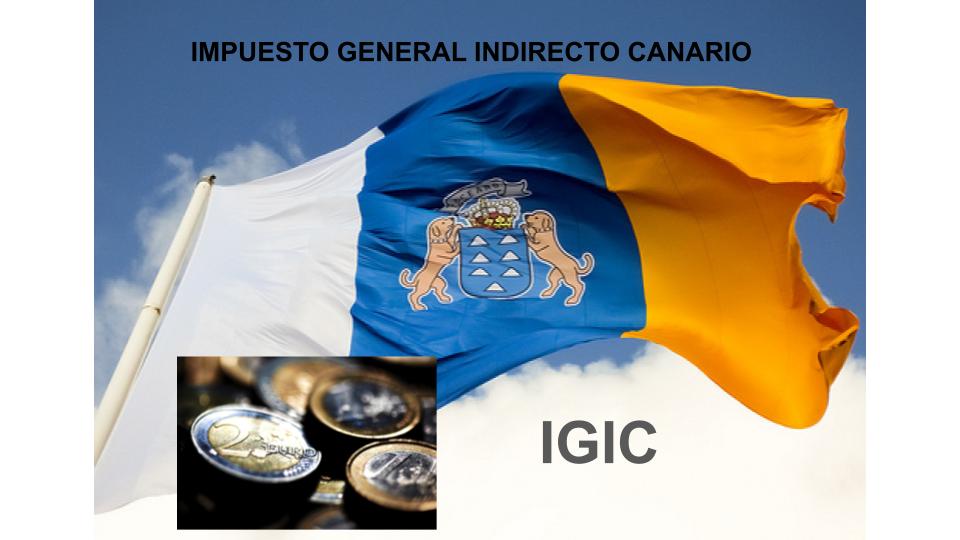
IGIC. THE CANARY GENERAL INDIRECT TAX
Speed up your business with these expert tips on "IGIC. The Canary Islands General Indirect Tax". Analyse and discover this TIP!
What is the IGIC?
This is an indirect tax on the supply of goods and/or services carried out by entrepreneurs or professionals resident in the Canary Islands in the course of their professional or business activity.
It also applies to imports of goods received in the Canary Islands, whatever the purpose for which they are destined or the condition of the importer. The entry of any goods from the mainland (mainland Spain), Ceuta and Melilla, member countries of the European Union and other third countries is considered to be an import.
The IGIG can be understood as a twin tax to the VAT, Value Added Tax in force in the rest of Spain as it is governed by the same liquidations, accrual dates, although the rates, as explained below, are lower.
Taxable persons subject to IGIC:
Taxable persons or persons liable to pay IGIC are considered to be entrepreneurs or professionals, persons and/or entities that carry out business or professional activities.
The obligation is shared by those persons or entities that exploit a property with the aim of obtaining continuous income over time: landlords and property developers.
IN SHORT, THEY ARE CONSIDERED TAXABLE PERSONS FOR GST IN ANY CASE:
- The trading companies (+).
- The self-employed.
- Those who carry out operations of:
- One or more supplies of goods or services involving the exploitation of tangible or intangible property, whether or not for profit.
- The urbanisation of land and the development, construction or refurbishment of buildings for sale, adjudication or transfer by any title, even on an occasional basis.
Tax rates:
To apply the IGIC, the Canary Islands self-employed person transfers the tax to his client by applying a percentage (tax rate) on the price of the operation (taxable base of the tax), and subtracts the IGIC that he has borne on his purchases, or that he has had to pay on the importation of goods.
One of the great advantages of the IGIC is that it has more advantageous rates than peninsular VATThe Canary Islands General Indirect Tax is divided into 9, including one at 0%, out of the 3 VATs.
ARE DISTRIBUTED AS FOLLOWS
- Zero rate: 0% for the delivery of water; the sale of sanitary products; the delivery of books, newspapers and magazines; the execution of works on social housing; the delivery of certain foodstuffs; inter-island air or maritime transport.
Deliveries of electricity will be taxed at 0% only when the consumers are natural persons who own an electricity supply point in their home with a contracted power equal to or less than 10 kW. In all other cases it will be at 3%.
The retail surcharge rates applicable to imports of goods subject to and not exempted from IGIC will increase in 2020 from 0.7% to 1.5%.
- Reduced rate: 3% for the mining industry; chemical industry; textile sector; wood industry; paper industry; land transport; vehicle repair.
- 7% general type: for all activities that are not covered by the other types set out above.
- Increased rate: 9,5% for deliveries of certain vehicles or means of transport.
- Increased special rate: 15% for cigars costing more than €1.8/unit; sale of alcoholic beverages; sale of jewellery; distribution of cartridges; sale of fur products; deliveries of perfumery.
- Special types: 20% for the processing of dark tobacco and 35% for the processing of blond tobacco.
Operations exempt from IGIC
However, the IGIC does not tax transactions carried out in the development of non-business activities, therefore, between private individuals. Nor is it levied on transactions that are carried out for no consideration.
Basically, we can define as activities exempt from IGICPostal services, health care, blood deliveries, social welfare services, education, services provided by sports organisations, cultural enterprises, insurance and reinsurance operations, financial operations, retail trade.
In 2022, as a new feature, it has been specified that the exemption for education services will not include accommodation and food services provided by halls of residence or student residences, nor those of driving schools for A and B licences and certificates for driving a ship or aircraft.
The self-employed should note that they are exempt from tax as long as their annual turnover does not exceed €30,000. (this limit is reviewed annually). However, this regime is optional. And it is an exemption which is not available to communities of property.
To calculate this volume of operations, you must take into account the total supplies of goods and services during the preceding calendar yearirrespective of the tax regime or territory where they are supplied or rendered. That is to say, the gross value of all transactions is taken into account, regardless of whether they are carried out inside or outside the Canary Islands.
Simplified IGIC regime:
This special IGIC regime applies automatically, unless expressly waived, to natural persons who carry out any of the activities referred to in the Order of 21 March 2007 of the Canary Islands Government.
TO GIVE YOU AN IDEA, THEY ARE EXEMPTED FROM THIS REGIME:
- Those whose turnover in the previous year exceeds 150,000 euros.
- Agricultural, forestry and livestock activities exceeding 250,000 euros per year.
- When the volume of acquisitions or imports of goods or services exceeds 150,000 euros per year, excluding IGIC, for all the business or professional activities carried out.
- In the cases strictly specified in the Order of Reference itself.
This scheme works as follows: the regulations directly fix the amounts of IGIC accrued on the basis of the application of rates or modules, from which the IGIC borne on purchases, investments and leasing of immovable property may be deducted, but within certain limits.
The input VAT deduction can be made either quarterly or as a one-off deduction in Q4. The result of the tax settlement (IGIC charged minus IGIC borne) cannot be below the limit established by law for each activity. As a general rule, a taxable person can only be taxed under the simplified IGIC regime if he/she is taxed under the objective assessment (modules) of the IRPF and vice versa.
APPLY THIS TIP TO YOUR PROJECT
- 💻 PRACTICE with an expert in the next practical webinar.
- 🔎 CONSULT more related TIPs with this same theme.
- 📖 AMPLIA your knowledge by downloading this EBOOK.
THINK ABOUT YOU
- 🚀 IMPULSA your company in the next acceleration programme, ¡book your place now!
- 🥁 PRACTICE with your project in this practical webinar, ¡apply for your place!.
- 🌐 CONTACT with other entrepreneurs and companies, ¡register and take part in the next Networking!
THINK ABOUT HELPING OTHERS
- 🤝COLLABORATE as a volunteer: expert, mentor, inverter, awarding, Spreading the word, challenging, innovating, creating a TIP...
- 💬 RECOMMENDS this programme to reach out to more entrepreneurs by Google.
- 👉 SHARE your learning!
- 📲 SEND this TIP 👇
Rate this TIP!
Click on the stars to rate
Rating "1" - Average " - Average5"
No votes yet, be the first to vote!
We are sorry you did not find it useful.
Help us improve this TIP!
Leave us a comment and tell us how you would improve this TIP









